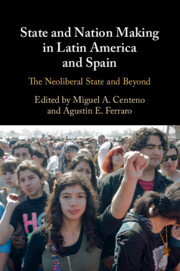Book contents
- State and Nation Making in Latin America and Spain
- State and Nation Making in Latin America and Spain
- Copyright page
- Dedication
- Contents
- Notes on Contributors
- Preface
- Part I Introduction
- Part II Economic and Territorial Power
- Part III Infrastructural Power: Reform Strategies
- Part IV Symbolic Power: Identities and Social Protest
- Part V Conclusions
- Index
- References
Part I - Introduction
Published online by Cambridge University Press: 03 August 2023
- State and Nation Making in Latin America and Spain
- State and Nation Making in Latin America and Spain
- Copyright page
- Dedication
- Contents
- Notes on Contributors
- Preface
- Part I Introduction
- Part II Economic and Territorial Power
- Part III Infrastructural Power: Reform Strategies
- Part IV Symbolic Power: Identities and Social Protest
- Part V Conclusions
- Index
- References
- Type
- Chapter
- Information
- State and Nation Making in Latin America and SpainThe Neoliberal State and Beyond, pp. 1 - 64Publisher: Cambridge University PressPrint publication year: 2023

